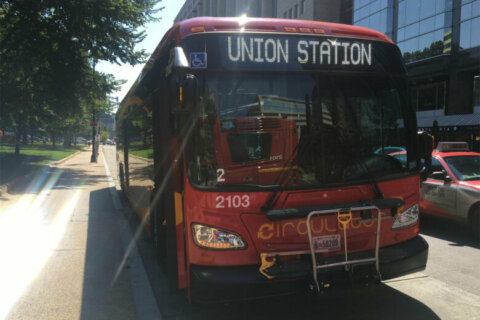WASHINGTON — Despite strong rhetoric and opposition from Maryland members, the Metro Board solidified significant changes to its operations Thursday, just days ahead of a deadline tied to a new Virginia funding law.
The changes effectively eliminate participation of the Metro Board’s eight alternate members in most meetings. For the current board, that means Federal Railroad Administration Chief Safety Officer Bob Lauby and several local government appointees will no longer have a voice.
Virginia lawmakers who included the requirement in the state’s bill providing additional dedicated funding to Metro argued the smaller board could improve governance. The bill takes effect Sunday.
Separately, the bylaws give significantly more power to the Metro Board chairman, D.C.’s Jack Evans, to organize committees.
Evans remained hopeful he would find a way to keep alternates involved through a provision allowing them to “contribute to” committee meetings or advisory groups from time to time.
“The idea of throwing the alternates out is not a good idea,” Evans said. “My approach going forward is ‘gotta let the dust settle here, everybody calm down a little bit.’”
He said the board would continue to meet twice each month. By September, Evans hopes to have more details on his plans for new committee assignments.
“What I don’t want to do is some contrived method and then lose the $154 million … so that’s why I’m saying I want to let the dust settle here and see where we are,” he said.
Pushback
Maryland Metro Board members pushed back on the changes Thursday, but did not block them.
“What we have lost in this process with these amendments is the expertise in various fields that alternates provide in committee settings and in the Metro environment overall,” Michael Goldman said.
“If Virginia wants to reduce participation by the Virginia alternates, that’s Virginia’s business. But when it takes away the effectiveness of Maryland’s two alternates, that’s Maryland’s business and we must object to it,” he added.
Goldman suggested Maryland could pass its own legislation in the future that Virginia does not like, and called it “phony” to suggest cutting the number of people participating in committee meetings would improve governance.
Under current appointments, appointees from Montgomery, Prince George’s and Fairfax counties, and the City of Alexandria would be sidelined in addition to Lauby, the federal safety expert, and the other federal alternate Anthony Costa. Christian Dorsey of Arlington County is now the voting member representing Northern Virginia localities who actually foot the bill for the state.
Federal appointee David Horner, however, attacked Maryland members’ “incendiary rhetoric of disenfranchisement, odiousness, slippery slopes, power plays by Virginia” as “unconstructive and misleading.”
Horner agreed with Evans that the board should now let the dust settle, tempers cool, and then discuss how eliminating the work of alternates on committees will impact the agency going forward.
“I think it’s an affirmative, positive step in the right long-term direction for WMATA. I don’t think it’s necessary … when defending this decision or these amendments to say we were made to do it. They stand on their own as a very good thing,” Horner said.
He hopes the appointing jurisdictions will now appoint better board members, and said the voting members can always call the alternates for input in their areas of expertise.
“A board of eight will be a forum for expert deliberation and oversight that’s less concerned than it is today with politics and careers in the public square,” Horner hoped.
Metro General Manager Paul Wiedefeld sees the board changes as having “very little” impact on his work, but sees a potential positive shift if voting representatives take somewhat more regionwide positions.
“Rather than more a jurisdictional sort of representation, and I think that’s always been one of the issues,” Wiedefeld said.
The positions of the voting members Thursday broke down along the same jurisdictional lines that even separate suggestions to further shrink the board would not have addressed.
“Virginia is holding all of us hostage and, in the process, is going to disenfranchise the people of Prince George’s County that I represent,” Malcolm Augustine said.
He represents Prince George’s County as an alternate member, and signed up to speak during the public comment portion of Thursday’s board meeting where the bylaw changes were formally adopted.
Augustine also argued the changes would make it harder for the board to work on and deliver on its responsibilities to Metro and the region, saying that allowing one jurisdiction to set the rules could lead to a slippery slope of regular legislative intervention.
“For now, we will vote for these odious bylaw changes, because to vote against them would be to veto and endanger Virginia’s dedicated funding obligation, which we are not prepared to do today,” Maryland’s Goldman said ahead of the vote.
“But, mark my word, we will continue to fight on multiple fronts to restore the position of the WMATA alternate to one that can participate in committee business and be in a position with responsibility and status that will attract citizens to serve as WMATA Board alternates, at least in Maryland,” Goldman said.








